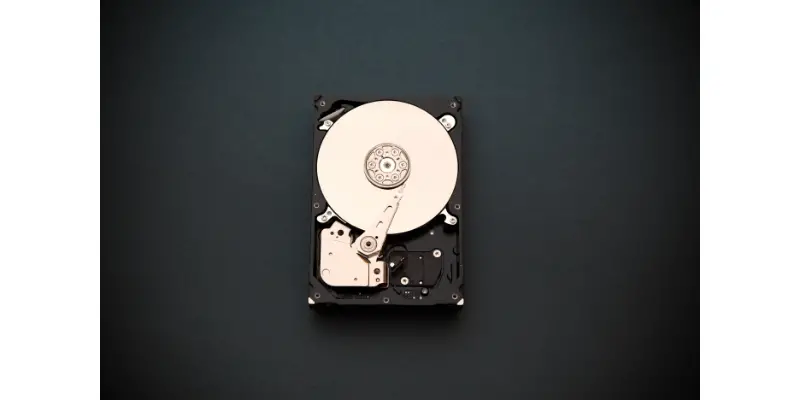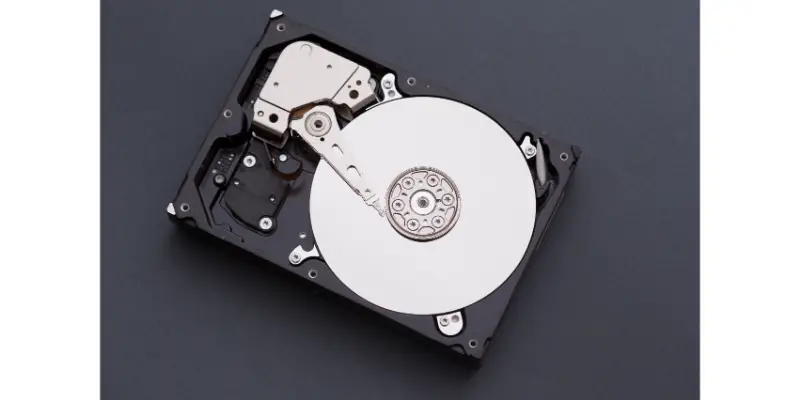Disclaimer: This post may contain affiliate links, meaning we get a small commission if you make a purchase through our links, at no cost to you. For more information, please visit our Disclaimer Page.
Have you ever noticed that your computer’s hard drive makes a constant “whirring” sound? It’s not just your mind playing tricks on you. That sound actually means there’s a problem, and it’s time to investigate.
The Hard drive of your computer runs constantly because the computer is continuously assessing the hard drive to execute all commands that you are giving it and ensure that all data is saved as you use your computer system.
Table of Contents
Why is my computer constantly accessing the hard drive?
Your computer’s hard drive is almost the most important component of your computer but not as important as the CPU. The CPU tells the computer what to do; it is the computer’s brain, but the hard drive controls the positioning, reading, and writing of the hard disk, which provides data storage.
Your computer constantly accesses your hard drive because it constantly reads from it to boot your computer, install and update your operating system, save any document or data, download and run game applications. The computer is always assessing your hard drive to read information from its storage.
The computer might work without a hard drive, but it will run slowly, and you might not be able to use the computer to its full capacity. It is also important to constantly check the size of your hard drive to avoid the risk of running out of space for your documents and the computer not working properly.
The computer hard drive can also be external or internal. The external hard drive can give you more storage space to keep your data, and it can only be assessed if you plug it directly into your computer system.
The hard drive being an important component of the computer, is designed to be written and rewritten for file storage and computing needs. One of the reasons the computer is constantly assessing the hard drive is that the hard drive stores all the data inputted into the computer.
Why does my hard drive run constantly?
Your computer hard drive is its storage unit. It stores all of your data – your files, documents, and even the operating system. The hard drive of your computer runs whether you are actively using it or not. This is because it does other background checks on your computer and it is not only storing data.
Security software updates, background scans, scheduled disk defragmentation, upgrading and installing Windows, online browsers or download managers, and game download are just a several of the background and maintenance activities it does.
When you use your computer constantly, it reads and writes your commands. It processes all commands to help produce the outcome you are looking for. You work on it, executing different commands, storing and saving files continuously, which is a good reason for running constantly.
Except where there are suspicious signals, there’s usually nothing to worry about when the hard drive keeps running.
Generally, your hard drive running constantly is nothing to worry about, even when you are not actively using your computer. But in some cases, it could be a sign for you to check the hard drive activities.
When you notice a sudden system slowdown, program crashes, screen freezing, or strange pop-up messages, the activities might be the consequence of harmful reasons.
It is highly recommended that you do a thorough virus check on your computer to avoid hard drive damage, since this might result in the loss of all your files and data recorded on the hard drive.
How do I stop hard drive activity?
When you find that some programs are taking too long to launch, the system is slowing down, unexpected sounds, an increase in damaged data, or the hard drive itself is failing, you may wish to suspend your internal hard disk activity in an attempt to decrease workload or repair it.
Putting your computer to sleep or hibernation may temporarily halt hard drive activity, but the hard drive will power up and continue functioning once the computer system is turned back on.
Aside from totally shutting down the computer system, which is one method of stopping hard drive activity, you may also manually turn off hard drive activity by going through various computer settings.
Stopping hard disk activity may not always extend its life. It may remove all stored data from the computer, however pausing hard disk activity may assist reduce computer burden and restore corrupted files.
You can manually turn off your hard drive when you:
- Go to Settings on your computer
- Click on System > Power & Sleep > Additional power settings > Change plan settings > Change advanced plan settings > Hard disk
- Select turn off hard disk after and input your desired minutes which allows setting a fixed amount of time
Another option you can explore is to take the hard drive out by yourself, but do not do this while the computer is still functioning. Be careful to do this on a clean and dry surface or, better still, consult a professional if you have to.
When you remove your hard drive, the computer still comes on, but it cannot load properly because the operating system is installed in the hard drive, so the computer is rendered useless until the hard drive is mounted again.
Should I turn off my hard drive when not in use?
Turning off your hard drive when not in use ultimately depends on you. You might want to turn off your hard drive for various reasons, such as to save battery life or energy consumption of your computer or to stop it from overworking and repair it. You might also be indifferent to the hard drive running all day, and you may not bother to turn it off.
Whatever the reason may be, here are some things you should know. Firstly, the hard drive doesn’t last long because you turn it off occasionally. It will use its expected life span and get damaged afterward.
Another thing is that whether or not you turn off your hard drive, your computer can still work, some processes might be slow, but they will work fine. Also, leaving your computer idle for a particular amount of time does not turn off your hard drive, so you can either turn it off when you are not using it or leave it on. The choice is ultimately yours to make.
Turning off your hard drive can help save energy and increase the life of your computer’s battery, but it will not make a substantial difference in the hard drive’s life.
When you turn off your hard drive and try to use your computer or anything else to access it, there will be a few seconds wait while the hard disk automatically spins back up and is switched back on before you can access it.
Conclusion
Your computer hard drive is an important component of your computer system. It stores all the data on the computer. External hard drives can also be used with a computer system; it works just like an internal hard drive, but it is mobile, unlike the internal hard drive.
A hard drive is not important for a computer to work, but when connected with a computer, it does a lot of processing and storage in the background, and that might make it seem like your hard drive is constantly running. This is because it is reading and writing commands you are giving the computer.
If you feel like your computer is overworking and you want to stop hard drive activity, you can manually turn it off via computer settings or just shut down your computer. Stopping your hard drive activities does not have any positive or negative effect on the hard drive, but it can help save your computer’s battery life.
Also, turning off your hard drive when not in use is solely your choice to make. There are no adverse effects to it and no advantages either, except you having some peace of mind and doing what you wish with your hard drive.


